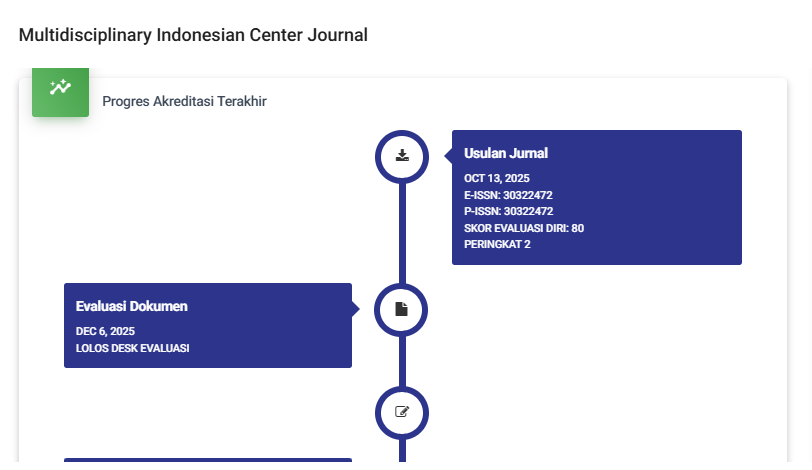HEROIC NARRATIVES OF GREEK MYTHOLOGY IN THE MOVIES CLASH OF THE TITANS AND WRATH OF THE TITANS: A COMPARATIVE LITERATURE APPROACH
DOI:
https://doi.org/10.62567/micjo.v2i3.871Keywords:
narratology, mythology, comparative literature, moviesAbstract
This study aims to analyze the representation of heroic narratives in two movies adaptations of Greek mythology, Clash of the Titans (2010) and Wrath of the Titans (2012), through a comparative literature approach and Vladimir Propp's narratology. The main character Perseus is the center of attention in the study of narrative structure because of his role as a mythological hero who faces a series of challenges that are full of values of courage, sacrifice, and determination. Propp's theory is used to identify narrative functions such as dispatch, magical agent, struggle, and transfiguration that appear in both movies. The method used is qualitative with content analysis technique by comparing the stories, characters, and moral messages as well as narrative functions in the two movies with the theme of Greek mythology. The results show that the comparison of the narrative structure of the two movies with the character Perseus has strengths in the dramatic aspects of heroic attitudes in accepting choices and fighting for life so that the integration of heroic material can be adapted to literature learning involving character values. This finding confirms that the narratological approach through comparative literature can be an important pedagogical tool to teach story structures with character values through popular media. This research recommends the utilization of mythological movies in literature learning and character education at various levels of education as a means of strengthening narrative literacy and understanding moral values.
Downloads
References
Arthur, J. (2021). The Value of Character-Based Judgement in the Professional Domain. Journal of Business Ethics, 169(2), 293-308, ISSN 0167-4544, https://doi.org/10.1007/s10551-019-04269-7.
Barbieri, A. (2022). Anatomy of chivalric destructiveness: Imagery of injury and culture of clash in old french heroic narrative. Wounded Body Memory Language and the Self from Petrarch to Shakespeare, 131-158, https://doi.org/10.1007/978-3-030-91904-7_7.
Calame, C. (2023). GREEK MYTHOLOGY: Discourse, Belief, and Ritual Action. Routledge Handbook of Fiction and Belief, 339-348, https://doi.org/10.4324/9781003119456-30.
Cicholewski, A. (2025). Challenging Heroic Narratives of Polar Exploration in Indie Video Games. Games and Culture, 20(2), 214-230, ISSN 1555-4120, https://doi.org/10.1177/15554120231196261.
Delgado, J.A.F. (2020). Mythology and Rhetoric Exercises at the Greek School. Genealogy of Popular Science from Ancient Ecphrasis to Virtual Reality, 95-113, https://doi.org/10.14361/9783839448359-005.
Dobrowolski, P. (2023). Idyllic, Heroic, and Sacrificial Poland. National Narratives in Patriotic Shows. Czas Kultury, 2023(1), 228-244, ISSN 0867-2148, https://www.scopus.com/inward/record.uri?partnerID=HzOxMe3b&scp=85168899326&origin=inward.
Doniger, W. (2022). Gods as Difficult Guests in Greek and Indian Mythology. Social Research, 89(1), 1-19, ISSN 0037-783X, https://doi.org/10.1353/sor.2022.0002.
Guerrero, O.F. (2022). The Goddess Demeter: Combative Motherhood, Ecofeminism and Ethics of Care in Greek Mythology. Ideas Y Valores, 71(179), 79-97, ISSN 0120-0062, https://doi.org/10.15446/ideasyvalores.v71n179.83317.
Haines, D. (2024). Heroic Fear: Emotions, Masculinity, and Dangerous Nature in British Colonial Adventure Narratives. Environmental Humanities, 16(1), 162-182, ISSN 2201-1919, https://doi.org/10.1215/22011919-10943145.
Hansen, W. (2023). Classical Mythology: A Guide to the Mythical World of the Greeks and Romans. Classical Mythology A Guide to the Mythical World of the Greeks and Romans, 1-394, https://doi.org/10.1093/oso/9780195300352.001.0001.
Kholodniak, O. (2023). Comparative literary theory: A cross-cultural approach to English literature. Research Journal in Advanced Humanities, 4(4), 255-273, ISSN 2708-5945, https://doi.org/10.58256/rjah.v4i4.1317.
Méniel, B. (2023). What does the narrative gain by being in verse? The case of the heroic poem (mid-sixteenth century-early seventeenth century). Moyen Francais, 88, 181-192, ISSN 0226-0174, https://doi.org/10.1484/J.LMFR.5.136691.
Nogueira, A.F. (2024). Reception of Heracles and Greek Mythology in the Hagiography of Saint Anthony. Antiguedad Y Cristianismo(41), 75-91, ISSN 0214-7165, https://doi.org/10.6018/ayc.617341.
Page, W. (2020). Patient narratives of illnesses requiring abdominal surgery in Cambodia: Heroic/stoic, and dealing with 'the ball of meat'. Global Public Health, 15(5), 763-775, ISSN 1744-1692, https://doi.org/10.1080/17441692.2019.1636113.
Papayianni, A. (2023). Greek Mythology. Religion and World Civilizations how Faith Shaped Societies from Antiquity to the Present 3 Volumes, 1, 116-117, https://www.scopus.com/inward/record.uri?partnerID=HzOxMe3b&scp=85209841131&origin=inward.
Ruta, A. (2020). Mythology and moral philosophy in the (Greek text) and (Greek text) by Clearchus of Soli. Eikasmos, 31, 111-133, ISSN 1121-8819, https://www.scopus.com/inward/record.uri?partnerID=HzOxMe3b&scp=85119132749&origin=inward.
Sansom, S. A. (2022). Active Learning Techniques to Enhance Conceptual Learning in Greek Mythology. Classical World, 116(1), 75-105, ISSN 0009-8418, https://doi.org/10.1353/clw.2022.0025.
Schwerhoff, G. (2023). Beyond the Heroic Narrative: Towards the Quincentenary of the German Peasants' War, 1525. German History, 41(1), 103-126, ISSN 0266-3554, https://doi.org/10.1093/gerhis/ghac085.
Scussel, F. (2023). Heroic failure narratives: building conveyed authenticity and engagement from downfalls. Consumption Markets and Culture, 26(5), 361-376, ISSN 1025-3866, https://doi.org/10.1080/10253866.2023.2219611.
Sulprizio, C. (2024). Playing with Greek mythology in Russian animation. Playful Classics Classical Reception as a Creative Process, 231-244, https://doi.org/10.5040/9781350418653.ch-013.
Taskin, L. (2021). Qualitative Research Methods. Research Design in Clinical Psychology, https://doi.org/10.1017/9781108236164.010.
Wang, X. Y. (2023). The Legacy of Ancient Cultures: Rational Concepts in Ancient Chinese and Ancient Greek Mythology and Their Significance in Modern Literature. Eurasian Journal of Applied Linguistics, 9(1), 110-122, ISSN 2149-1135, https://doi.org/10.32601/ejal.901010.
Weyant, E. C. (2022). Research Design: Qualitative, Quantitative, and Mixed Methods Approaches, 5th Edition. Journal of Electronic Resources in Medical Libraries, 19, 54-55, ISSN 1542-4065, https://doi.org/10.1080/15424065.2022.2046231.
Woo, P. Y. M. (2022). Gods and monsters: Greek mythology and Christian references in the neurosurgical lexicon. Surgical Neurology International, 13, ISSN 2152-7806, https://doi.org/10.25259/SNI_70_2022.
Zha, M. (2022). Comparative Literature Approach to Translation Studies. New Frontiers in Translation Studies, 49-63, ISSN 2197-8689, https://doi.org/10.1007/978-981-19-0995-5_5.
Downloads
Published
How to Cite
Issue
Section
License
Copyright (c) 2025 Aji Septiaji, Nanis Regina Choerunnisa, Neci Siti Aliyah, Novi Silvia, Erna Rahmawati

This work is licensed under a Creative Commons Attribution-ShareAlike 4.0 International License.



























